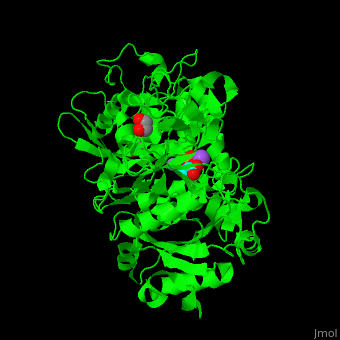Phosphoenolpyruvate carboxykinase
From Proteopedia
(Difference between revisions)
| Line 3: | Line 3: | ||
== Function == | == Function == | ||
'''Phosphoenolpyruvate carboxykinase''' (PEPCK) catalyzes the conversion of oxaloacetate to phosphoenolpyruvate (PEP) and CO<sub>2</sub>. PEPCK is part of the [[gluconeogenesis]] pathway<ref>PMID:9242918</ref>. There are 3 types of PEPCK distinguished by the energy source of the reaction which can be GTP, ATP or diphosphate. | '''Phosphoenolpyruvate carboxykinase''' (PEPCK) catalyzes the conversion of oxaloacetate to phosphoenolpyruvate (PEP) and CO<sub>2</sub>. PEPCK is part of the [[gluconeogenesis]] pathway<ref>PMID:9242918</ref>. There are 3 types of PEPCK distinguished by the energy source of the reaction which can be GTP, ATP or diphosphate. | ||
| + | |||
| + | See also: [[Gluconeogenesis]]. | ||
== Structural highlights == | == Structural highlights == | ||
Current revision
| |||||||||||
References
- ↑ Hanson RW, Reshef L. Regulation of phosphoenolpyruvate carboxykinase (GTP) gene expression. Annu Rev Biochem. 1997;66:581-611. PMID:9242918 doi:http://dx.doi.org/10.1146/annurev.biochem.66.1.581
- ↑ Dunten P, Belunis C, Crowther R, Hollfelder K, Kammlott U, Levin W, Michel H, Ramsey GB, Swain A, Weber D, Wertheimer SJ. Crystal structure of human cytosolic phosphoenolpyruvate carboxykinase reveals a new GTP-binding site. J Mol Biol. 2002 Feb 15;316(2):257-64. PMID:11851336 doi:http://dx.doi.org/10.1006/jmbi.2001.5364
Proteopedia Page Contributors and Editors (what is this?)
Michal Harel, Alexander Berchansky, Joel L. Sussman, Jaime Prilusky

